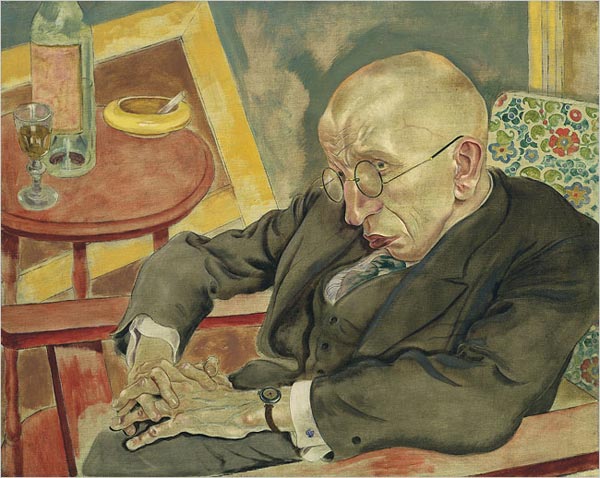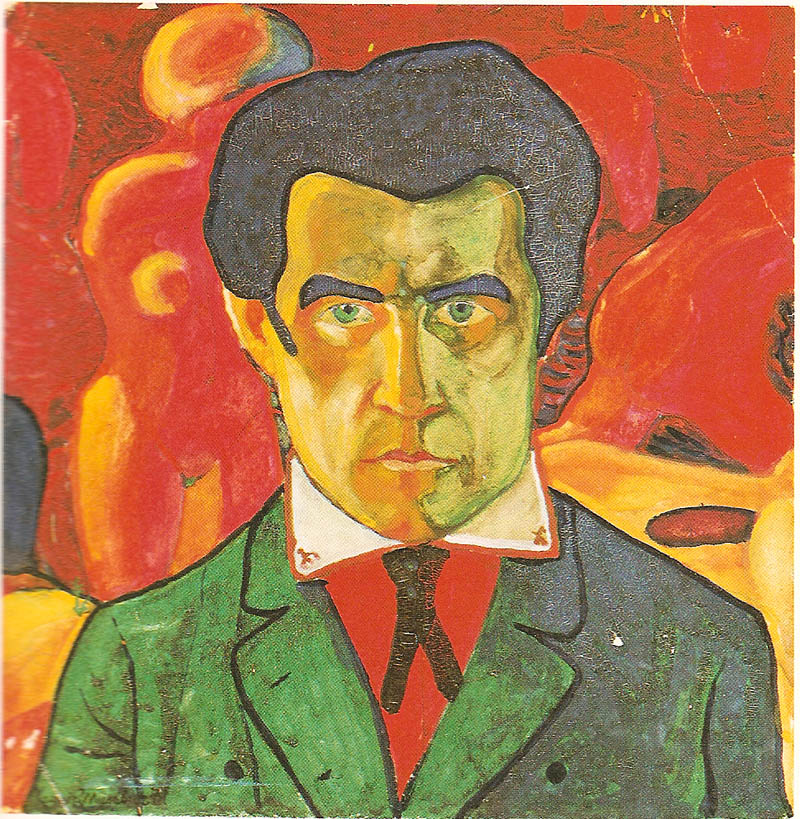 The Poet Max Herrmann by George Grosz
The Poet Max Herrmann by George GroszI always think of the ending first, and then the beginning last; a gap in the tooth Of. After a while, thought becomes like star-fossils. The Talmud: “We don’t see things as they are; we see things as we are.” I have learned not to alienate myself from learning, because the exclusions of the precisions of Interest is a downfall, particularly when one ponders a type of false, complex “fate” that is within disassociation. Everything is as distinct as some historic diary.
Thought goes through the skull; the ears tingle. Foucault: “People know what they do, most people even know why they do what they do, but what they don’t know is what they do does.” With the admission of an unfriendly United States, the rights of the rebels are apparently to aid the pirates on every sea. Distance and time appear to have eyes that are inexpressibly horrible. Conspicuous amongst a glossy radiance, the worst advantage is the thriving, stirring, energetic body that pretends to run errands for “the better of our nation.” The power of charm, the power of foolery, stations itself.
—
Trochilick motions. The way a bird flies by the window, seeing it with the peripheral.
—
As for Word against Desire? My soul touches upon nerves and I am inward at present as much as my life draws a curtain across from it, as fast as principal points that come to pass, that are for the every day of which to be trusted. Every day to have what is most astonishing, a subject in the world so eloquent, to sharpen misery in this life can be avoided; to remind you of specimens, of singularity, of the light that other previous opinions said as much that was odd and childish, but a notion to spring out of the way of thinking in which one will see nothing that one has not placed, or weighed, in ones own light. The exact invisible friction from balance will have gravitation like a stranger’s nose with equal confidence in all places concerning it. Now to add: if any thing differed from description, this is the perfect beauty; sweet air of the heavens!—what splendid vibrations in regions of the heart! The brain being little more than a whisper, like looking into pupils, to come to immediate contact, to be quieted more suddenly.
Observed: A woman wearing a pink hoodie walks a brown dog around the neighborhood. An elderly man gets out of a silver car that had parked down the street, closing the door slowly, his hand staying in the same position for a few moments without moving a blazing muscle as if listening intently, or thinking about the times when his girly-girl girlfriend would blow sweet everything's to him from out of the reflecting window. Where is she now. I think of the joists in his frail joints, time not giving a diddly-squat as he walked up the green hill with a woman that was wearing purple pants reminding me of manzanita trees.
Hatred shrinks everything. Or blows it up to the size of a pinhole, that enormously-tiny. The heart, when aching, turns flips in the chest, the stomach reacts by mimicking; the mind tries to comprehend the visual of these movements but there are no visuals nor words available for such emotions.
Came across this wondrous poem by Mazen Kerbaj, titled, DON’T FEED THE ARTIST:
What is an artist’s status in society? Is he a half-god, a parasite, an
exhibitionist or a circus freak?
What kind of relation does he have to his viewers and non-viewers?
Do his pictures need to be seen for them to exist?
Is creating a work of art like a boxing fight? Who emerges the winner? Who
is the judge? What is the ring?
At an exhibition, is it the artist or the work of art exhibiting
himself/herself/itself the most? To whom are they exhibiting themselves?
When and where does an exhibition begin? And when does it end?
Far from answering such questions, Mazen Kerbaj tries at least to ask them.
For ten days he will shut himself inside a glass cage (exhibiting himself)
to work. As soon as any picture is finished, it will be hung on the walls of
the cage, allowing the viewers to follow step-by-step the evolution of the
exhibit.
On the final evening (during the preview/taking down) the exhibition can
finally begin, and finish.
—
Susan Christie sung something like, “His life’s like cotton-candy and an illusion not much there.” Paraphrasing the paraphrasables. The color chocolate enhances concentration. History is more than a “record.” Is History behind itself?
As if saying “if you know what I mean” changes the entire meaning of a sentence.
I love to look at young people and imagine how they will look when they are old.
—
Law streams out to strive for steadiness, we touch it without temperature in the body. 98.6 degrees, like a corresponding instrument of the soul. Why do my wings tuck themselves out of view? What is outside of How? Do not move! You are being watched! You will be on CNN. You will be a flare from a bomb. You will be universally-driven to a Brand New Fundamental Tomorrow. Today is clicking itself away, like the scratching-sound on the window late at night; you grab the gun, you wait, you observe more than waiting.
When I Think, it is like parrot-chatter. I enter from the side of a building which is really the front. Looks are deceiving. I am smothered in your Llanguage, your Lloveliness, propelled and inflated like a triumphant hippo, starry old skies always remain, clawed out the black of the sky, left it flashing with bright white, like the power of childhood, and then childhood, like a bolt, dissolves into another universe, seemingly reinforced by the other universes surrounding us. Life, shadowed by memory, the terrain of, indeed, the multiplied cosmos.
Should I encounter a house to adopt or to adapt, to resemble or to collect the seeds of the scene and scatter them into The Now? Chicken-clawed out of everything, raised my hand, you slap at it. Operate into me, drift into me like a fog, between our words which are femtoseconds apart rather than attoseconds. It’s not a language we speak when we speak.
The sleeping giant sleeps merely to dream of being as basic as Matter. Who were the sleeping giant’s parents? He may never know the answer to that question, or it is a secret; but no secret to me, because I know, but I will never tell. No matter what you think of or what answer you expel, it will be incorrect, incorrect, incorrect. Errorerrorerror. Wider than pupils, bright in Bright.
—
The “tide” of The Beach Boys is being calmed by Michael Jackson's “moon” walking. Was.
—
Goethe: “Unless the eye contained the substance of the sun how could we ever look on the light?”
—
Wordsworth: “. . .In my thoughts, There was a darkness, call it solitude / Or blank desertion, no familiar shapes / Of hourly objects, images of trees; / Of sea or sky, no colours of green field; / But huge and mighty Forms.”
—
Often times certain art burns me up worse than a pyrotechnician’s miscue. A possible tornado came through during my early childhood; the way I held the guitar, what snatched me away from history? I became an alien to this world, collecting strange devices out of pure curiosity, I was phenomenally distracted, immersed in unclear boundaries, floating in ambiguous space with incomprehensible questions tugging at my throat. I typically answer myself with a soft, whispering voice and often the words are unknown, partially inaudible like dream-speech. Abstract words are stunningly truthful and they make me sleepy.
Dreams dripping from my ears. I don not find great moods, they find me, and then I examine their possibilities and bend them into my own reality. Who is tracking our Internet activities? The poet and the poet’s poet’s friend’s dog. Ginsberg once remarked that there is no Beat Generation, that it was all a journalistic hex.
Whatever it takes to levitate. I won the coin toss, but you can go first.
I am too Numerical for a Tongue.

The Poor Poet by Carl Spitzweg (1839): [From Here: “Spitzweg depicts a writer living out the familiar image of the starving artist in wretched conditions in a small room in an attic. The painting contains many significant images. The poet writes while huddling under his bedcovers and wearing a tattered coat and nightcap. The writer has been burning some of his own work – most likely volumes I and II since volumes III and IV remain in bundles on the floor. The fire in the room has obviously gone out since the poet rests his hat on the cold stovepipe and no live coals are visible in the stove. Indeed this cold stove is the darkest part of the picture and symbolizes the writer’s sorry state of affairs.”]

